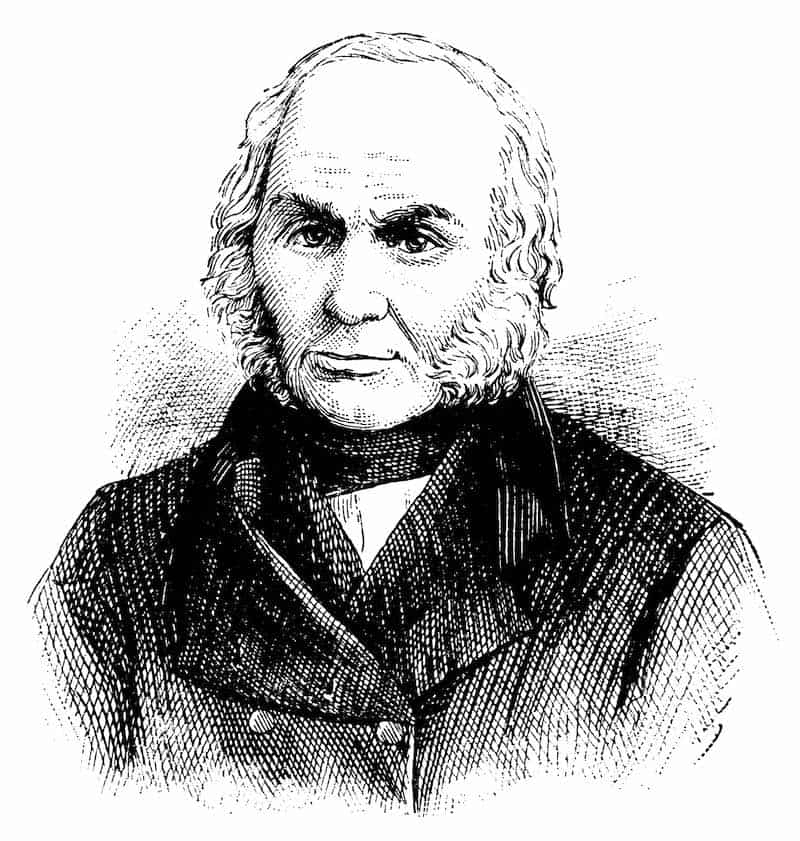John Quincy Adams in many respects paralleled the career as well as the temperament and viewpoints of his famous father, President John Adams.
John Quincy Adams was born in Braintree, Massachusetts in 1767. When he was seven, his mother took him to the top of nearby Penn’s Hill where they heard the bombardment and saw the smoke of battle rising at Bunker Hill ten miles up the bay. When he was twelve, he started a diary which he kept until just before he died.
John Quincy was educated in Europe while a teenager accompanying his father’s diplomatic journeys. He spent time in Russia, the Netherlands, and Britain.
In those days, travel could be perilous. Sailing from America to Europe took six weeks or more. It typically involved cramped quarters, bad food, storms, sea sickness, and the risk of his father being hanged if stopped by the British.
Returning to America, John Quincy received a degree from Harvard in 1787, read law and began practice in Boston. By then he was already one of the most learned men of his time, an extraordinary linguist who, it was said, could write English with one hand while translating into Greek with the other. He spoke eight foreign languages.
Washington appointed him minister to the Netherlands in 1794, and his father appointed him minister to the Berlin Legation in 1797.
In 1803 he was made U.S. Senator by Federalists in the Massachusetts Legislature. Over time, he broke with Federalist policies and was denied re-election.
After an interval of teaching at Harvard, he was made Ambassador to Russia in 1809 and Ambassador to England in 1815. In 1814, he was part of the American delegation that negotiated the Treaty of Ghent, ending the “War of 1812.”
His success as a diplomate made him a clear choice as President James Monroe’s secretary of state in 1817. Adams excelled in that position, arranging with England for the joint occupation of the Oregon country, gaining Florida from Spain, and formulating, with the President, the Monroe Doctrine.
Since moving to Washington, D.C., it was his summertime habit to rise between four and five in the morning, walk two miles to the Potomac, bathe in the river for half an hour, and then walk back. Like other bathers, he swam in the nude, although he was sometimes seen wearing a black cap and green goggles.
It was political tradition that Adams as Secretary of State was considered the heir to the presidency. But the old ways of choosing a president were giving way to the call for a popular choice.
Running for president in 1824, Adams won fewer popular votes than Andrew Jackson. The election was decided in the House of Representatives after Henry Clay threw his votes to Adams putting him over the top. When President Adams made Clay his secretary of state, Jackson claimed there was a “bargain and corruption,” a claim that would hound Adams throughout his term.
But this was far from his only problem. Opposing parties formed: “Adams men” versus “Jackson men” or Democrats. The Congress was divided and often blocked his agenda. His ambitious programs for strengthening the central government, controlling public lands, and improving national transportation routes were opposed by state’s rights interests. Southerners opposed Adams for fear that he would try to outlaw slavery.
John Quincy Adams lost the presidency to Jackson in 1828. Then, his oldest son died by accident, although some thought it was a suicide. But Adams was not finished. In 1830, he was elected to Congress and was reelected to nine terms. He had a long and distinguished career in the House where he fought against slavery until his death in 1848.
He fought the admission of Texas as a slave state. He challenged the gag rule that automatically tabled petitions about slavery. It took Adams seven years to achieve its repeal. He was rewarded with an ivory cane which now resides in the Smithsonian.
In 1841, Adams represented the defendants in the Amistad case in the U.S. Supreme Court. He argued that the Africans, who had seized control of a Spanish ship on which they were being transported illegally as slaves, should not be deported to Cuba (a Spanish colony where slavery was legal) but should be considered free. The court agreed with Adams and many of the defendants returned home. He did not bill for his services.
On February 21, 1848, John Quincy Adams collapsed on the floor of the House chamber having suffered a stroke. He died two days later at age 80.
To the end, “Old Man Eloquent” had fought for what he considered right. He had carried on a tradition of scholarship and service that made the Adams family one of the most distinguished in American history.




